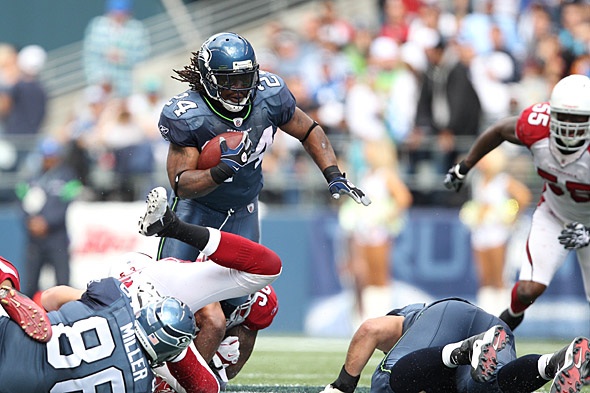
The Seahawks have slightly more than a week remaining to get a deal done with free agent running back Marshawn Lynch. If the Seahawks and Lynch cannot come to terms on a new contract by March 5, the Seahawks have the option of tagging him their “franchise” player, which would virtually assure Seattle would retain Lynch’s services.
If the Seahawks apply the franchise tag to Lynch, any other team signing him to an offer sheet would have to compensate Seattle with a pair of first-round draft choices, absurd compensation, particularly for a running back, and especially for one already in the second half of his NFL career.
Seattle’s other option is to use the “transition” tag on Lynch. In this event, the Seahawks would not be entitled to draft picks if Lynch signed an offer sheet with a competing club, but they would be able to match that offer. A match would ensure that Lynch, Seattle’s leading rusher the past two seasons, would remain a Seahawk.
The Seahawks have had one ugly experience with the transition tag. Just weeks after losing Super Bowl XL in 2006, the Minnesota Vikings offered Seattle’s young All-Pro guard, Steve Hutchinson, a seven-year, $49 million contract. Then-GM Tim Ruskell used the transition tag on Hutchinson.
Cleverly, the Vikings included in their offer to Hutchinson a “poison pill” clause, which would have forced the Seahawks to guarantee all $49 million of Hutchinson’s salary had they matched Minnesota’s offer. The Seahawks could not, did not, and lost Hutchinson. Seattle retaliated by inserting its own poison pill into an offer to WR Nate Burleson, stealing him from the Vikings when Minnesota could not guarantee the entirety of the offer the Seahawks had made to Burleson.
Poison pill deals, although legal, have not been used in the NFL since Hutchinson and Burleson traded teams.
After the Hutchinson fiasco, it took Seattle five years to rebuild its running game, doing so only after acquiring Lynch from Buffalo and using No. 1 draft picks on offensive linemen two years in a row. Naturally, the Seahawks are not inclined to break something it took so long to fix.
Lynch rumbled for 100 or more yards in six of Seattle’s final nine games, finishing with 1,204 yards and a career-high 13 touchdowns, making him the Seahawks’ first 1,000-yard rusher since Shaun Alexander in 2005. Remarkably, Lynch achieved a 1,000-yard season despite Seattle’s loss of left tackle Russell Okung, right tackle James Carpenter and right guard John Moffitt all suffering season-ending injuries.
The question: Is it in the Seahawks’ best interest to apply the franchise tag to Lynch? General manager John Schneider apparently thinks so, saying as much on the team’s web site, seahawks.com. Again, if Schneider and Lynch come to terms, no franchise (or transition) tag would be necessary.
But if they don’t, the Seahawks will apparently apply the tag, which, for running backs in 2012 is valued at $7.7 million, down from a high of $9.6 million a year ago.
When Lynch came into the NFL with the Bills, he received a signing bonus of $3 million and salaries that have averaged $3.15 million in the six years since. Is he now worth the tag value of $7.7 million, the average earned by the top five backs in the league?
If the Seahawks decide he is, they will have to begin negotiating with Lynch on a long-term deal at the $7.7 million per-year figure.
Lynch’s agent is likely seeking a contract similar to the one Carolina handed DeAngelo Williams: $21 million guaranteed in a five-year deal that could be worth $43 million. Schneider is likely to counter with an offer similar to the one Frank Gore got in San Francisco: $25.9 million over four years with $13.5 million guaranteed. Lynch and the Seahawks could agree on a deal somewhere between Williams’ and Gore’s. Or not.
“We’re having great discussions,” Schneider said in the post on the Seahawks’ web site. “There’s no animosity. It’s good dialogue.”
In the absence of signing Lynch to a long-term contract, and instead of applying the franchise tag, the Seahawks could always transition him. That would save Seattle about $1 million since the projected value of the transition tag for running backs is 6.7 million.
Given that it took Schneider about six months to complete Lynch’s acquisition from the Bills, it’s unlikely Schneider will allow Lynch to walk after 29 games (regular and post-season). But barring a long-term deal, should the Seahawks apply the franchise tag to Lynch? What best represents your view?
[polldaddy poll=5978937]
